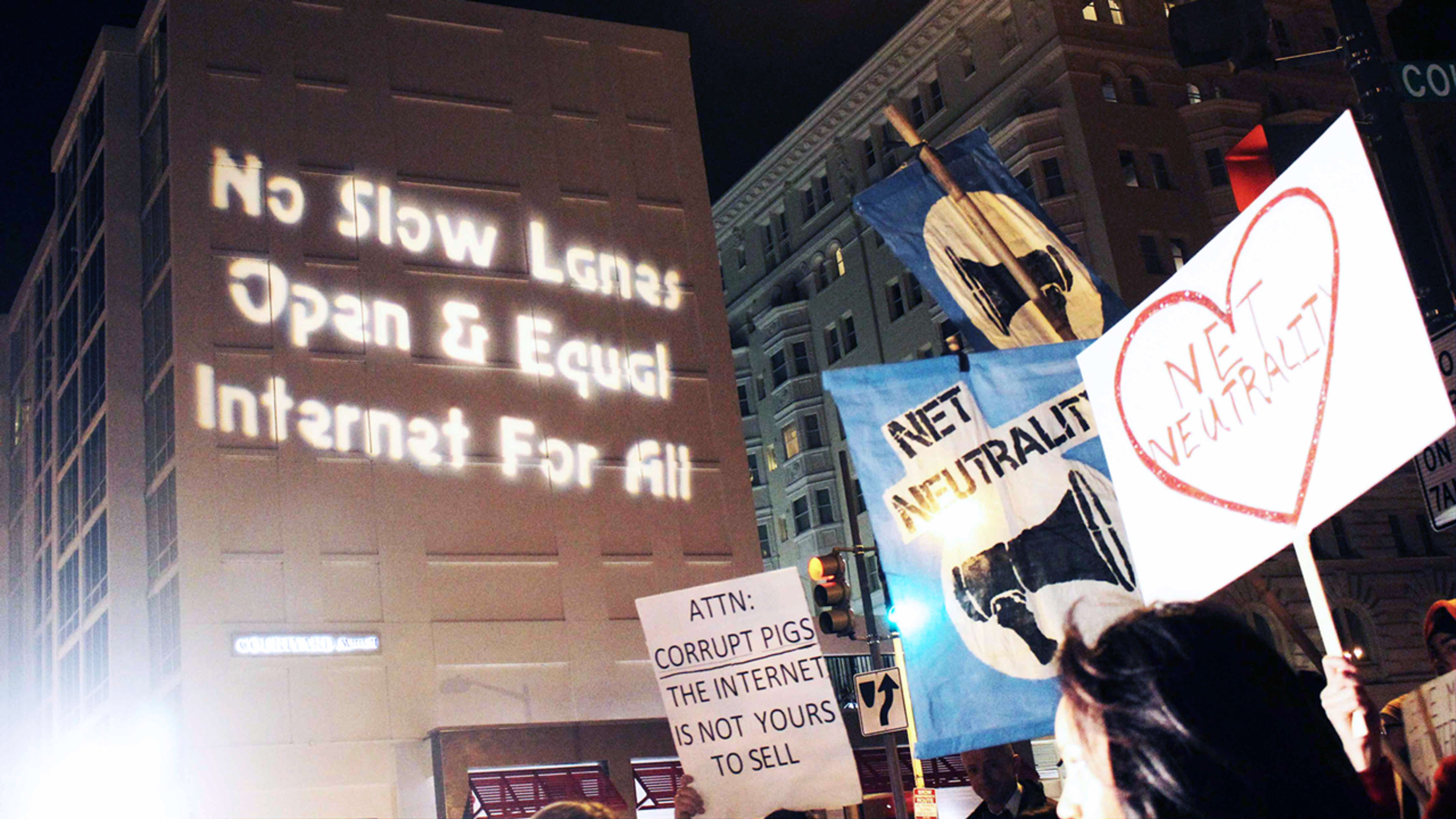A strong network neutrality bill is advancing through the California legislature, and the Big ISPs–mainly AT&T and Comcast–are working overtime to stop it in its tracks.
On Wednesday the State Assembly Communications and Conveyance Committee will vote on State Senator Scott Wiener’s SB 822, which, like the 2015 Open Internet Order recently rescinded by the FCC, prohibits broadband providers like AT&T and Comcast from blocking, slowing, or expediting (for a price) any legal internet traffic.
Weiner’s bill passed the state Senate on May 30 by a healthy 23 to 12 margin. In the weeks leading up to that vote, lobbyists for the big ISPs tried to spread enough doubt about the bill’s possible implications that lawmakers would simply not vote on it. Senate Democrats needed an extra date to find the votes, but they found them, and the bill moved on to the Assembly.

But the ISPs are powerful, well-monied, and well dug-in with California lawmakers–especially AT&T, which contributed $511,000 to the California Democratic Party in 2017, and $339,500 to the California Republican Party. (Check out this swanky golf shindig that AT&T throws for California Democrats every year.)
By Monday night people close to the politicking were saying the California net neutrality bill is in grave danger of being neutered in committee before being put to a vote.
Dozens of lobbyists working the halls of power
The big telco and cable company internet service providers (ISPs), and their trade groups, have been working against California network neutrality legislation since the bills began to appear in Sacramento late last year. The bills were meant to fill the void left by the 2015 Open Internet Order, which the FCC voted to invalidate last December.
The EFF’s Ernesto Falcon says the telecom and cable companies had 30 to 40 contract lobbyists holding meetings with lawmakers months before the state Senate vote. These contract lobbyists are based in and around the state capital and market their services to clients by touting their close relationships with lawmakers. Many are former staffers who worked in the offices of assembly members.
After the Senate vote, the Big ISP lobby intensified its existing tactics, and began working on members of the Communications and Conveyance Committee to amend and weaken key parts of the original SB 822. The committee chairman Miguel Santiago in particular has been the target of vigorous lobbying.
One network neutrality advocate reported Monday night that Santiago wants to remove several key provisions from the bill, including language that prohibits ISPs from charging extra carriage fees from internet companies that want their traffic delivered faster down the last mile to users.
“Zero rating”
Santiago also reportedly wants to remove a key part of the Weiner bill that prohibits a controversial ISP practice called “zero rating.”
Zero-rated services are bundled into a wireless user’s plan and don’t count against the user’s monthly data allotment. It’s a clever way for the ISP to give competitive advantage to one of its own services or that of a partner over competing services and count against data totals. It’s a bit like Walgreens giving away its own brand of cold medicine for free while the brand-name cold medicine next to it on the shelf costs $14.99. There are some obvious problems with that, but the argument that AT&T and Comcast lobbyists is screaming from the rooftops seems a little hard to swallow—that poor people will be hurt because (to stick with the metaphor) they won’t be able to get the free cold medicine.
By prohibiting most (not all) kinds of zero rating, Weiner’s SB 822 goes even farther than the 2015 Open Internet Order, a fact the ISP lobby makes loudly and often. The FCC was just beginning to study zero rating when it passed the Open Internet Order in 2015, Falcon points out. “The California law essentially picked up where the Open Internet Order left off,” Falcon said.
AT&T in particular is threatened by SB 822’s prohibition of zero rating. One of the telecom giant’s key motivations for acquiring Time Warner is so that it can zero-rate content like HBO as part of its wireless data plans.
AT&T’s trade group, CALInnovates, commissioned a report from a Boston-based group called The Analysis Group to make the point to lawmakers that zero rating saves Californians millions every year, and helps low-income people the most.
The CALInnovates people held a press conference in Sacramento to introduce the research to lawmakers. They held private meetings in which they handed out hard copies of the report. Two sources told me that CALInnovates staffers ran the meetings but that AT&T reps were present. The author of the report, Dr. David Sosa, was also in attendance.
The point of The Analysis Group’s report was to show that Californians save enormous amounts of cash each year by using zero-rated services, and that low-income people benefit the most. But, as net neutrality proponents were quick to point out, the report presented just two pages of numbers, and was light on specifics about the sources of its data and how the savings totals were calculated. For instance, it’s unclear from the report if the savings numbers included usage of T-Mobile’s BingeOn, which the proposed net neutrality legislation would not prohibit because it exempts music streaming from all sources from counting against data totals. SB 822 prohibits only zero-rating plans that hinge free data on the specific provider of a service. (According to net neutrality proponents, the ISP lobbyists have been telling California lawmakers that SB 822 prohibits all kinds of zero rating.)
The Western Center of Law and Poverty says zero-rated services actually hurt poor people the most. Research shows low-income people are more likely to rely on wireless service for their internet access (as opposed to home broadband), and wireless data always have a monthly cap. So they’re more likely to be pushed into using zero-rated services as a way to avoid maxing out their data allotment and possibly incurring expensive overage charges, the WCLP points out. Moreover, zero rating gives ISPs an incentive to drop data caps further to make subscribers more and more dependent on the zero-rated sites or services.
Not dumb pipes
The arguments of the Big ISP lobbyists also center on their often-cited claim that, because people are using so much broadband and because usage is growing so quickly, ISPs will not be able to upgrade the capacity of their networks to keep up with demand unless they are allowed the freedom to do things like set up pay-to-play internet fast lanes. If not allowed those things, the ISP lobbyists say, the only way the ISPs can raise enough money to upgrade their networks is to pass on the cost to consumers.
Here’s how the California Cable & Telecommunications Association puts it in a letter to California lawmakers:
“ISPs built the Internet to what it is today with billions of private investment dollars and increased broadband speeds to levels never before imagined. Sadly, SB 822 would not provide ISPs with any incentives to continue to do so in California. The real winners with SB 822 would not be consumers, but large businesses that, left unconstrained by network costs and obligations, send huge amounts of Internet traffic that could potentially congest broadband networks.”
When trying to make the case for rolling back the net neutrality rules in the 2015 Open Internet Order, FCC chairman Ajit Pai highlighted a study showing that ISPs slowed down their investments in their networks after the 2015 order took effect. But Pai’s study, upon closer examination, fell far short of showing that ISP infrastructure spending fell as a result of the order–especially in 2016 and 2017.
The Big ISPs, it turns out, aren’t exactly living on a shoestring budget. They are massively profitable businesses that, in truth, face constant pressure from investors to squeeze as much profit as possible out of existing infrastructure as possible before spending the money to upgrade. At day’s end, big telecom and cable companies are moved to invest in their networks by the fear of losing subscribers to a competitor, and little else. Note that in city after city where Google Fiber launched its gigabit-speed service, suddenly AT&T and Comcast became interested in launching similarly fast services.
And that may be the main reason that network neutrality protections should be imposed on ISPs from the outside–by a regulatory body–not by the ISPs themselves: The business of selling broadband service in the Internet Age has evolved in such a way that the pressure to monetize broadband networks–to take a larger carriage fee for delivering the product of hugely profitable Googles, Facebook’s, and Netflixes of the world–is so great that safeguards are needed to make sure those big broadband pipes remain content-agnostic.
With the 2015 Open Internet Order, those safeguards were put in place and ISP investment in their networks did not sag significantly. That’s why it’s hard to see Pai’s reversal of the 2015 order as little more than a giveaway to the telecom and cable companies.
If California lawmakers see it that way (they should) the state might become a real problem for ISPs. California is a progressive and influential state, so it would not be strange if the state passed tough new network neutrality protections and other states followed.
We’ll be watching the crucial vote in the California Assembly tomorrow, and we’ll have a full report.
Recognize your brand’s excellence by applying to this year’s Brands That Matter Awards before the early-rate deadline, May 3.
